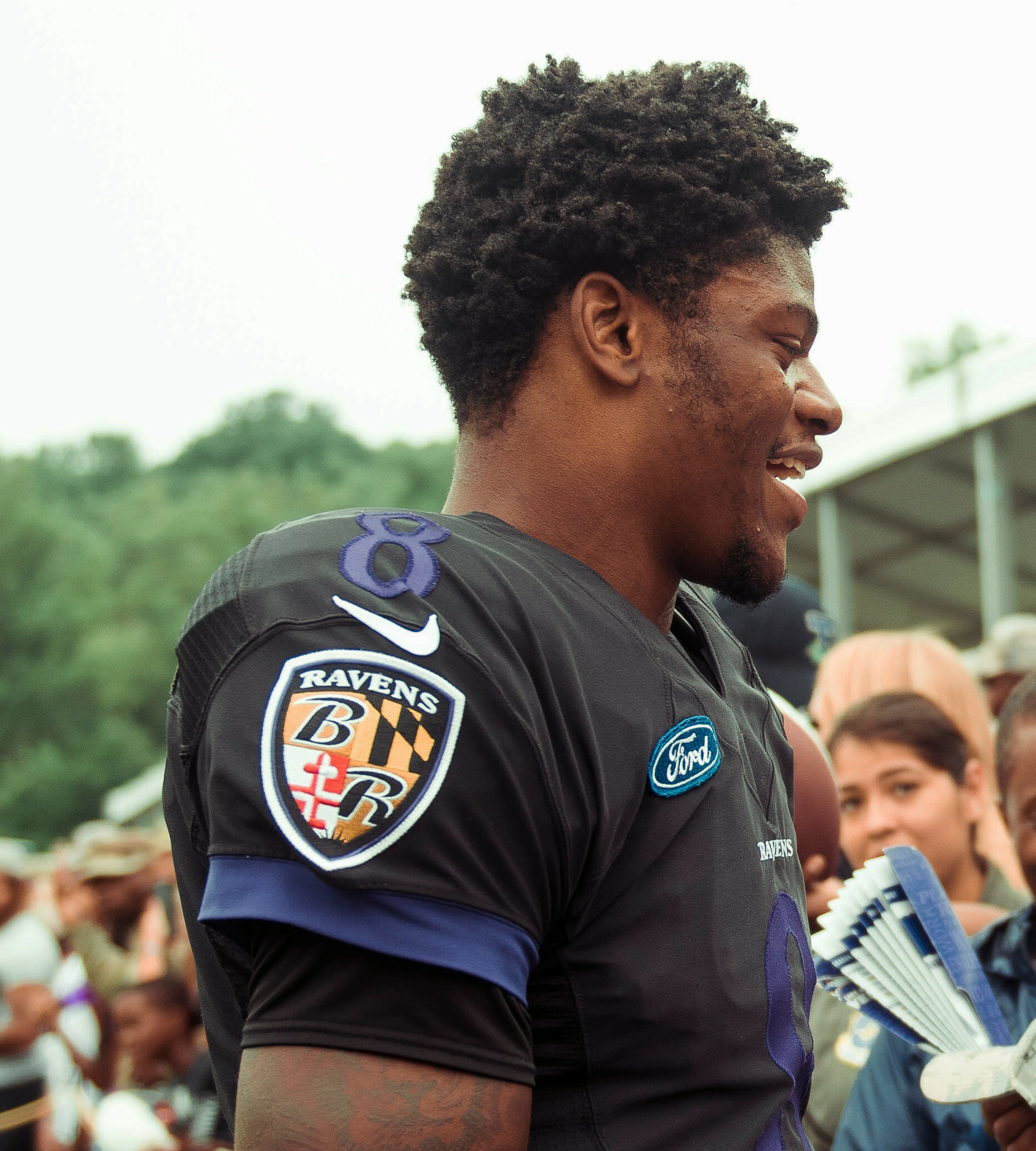Lamar Jackson won the 2019-2020 MVP award on Saturday, February 1 by Unanimous Decision (Wikimedia Commons)
Lamar Jackson is simply spectacular on the gridiron.
This 2019-2020 NFL season, the 23-year-old quarterback from the Baltimore Ravens broke tackle after tackle, record after record, and added a tally to his club’s win column more times than the city of Baltimore has ever seen. It was a season highlighted by an all-time quarterback record of 1,206 rushing yards, a league-leading 36 touchdown passes, two games with a perfect quarterback rating, and on top of it all, a franchise record of 14 wins and the team’s first-ever #1-overall seed in the AFC playoffs. It was a remarkable year for a quarterback of any age, let alone someone who couldn’t legally drink until just a couple of years ago.
Jackson shattered records and expectations each and every week he touched the field, and on Saturday, February 2, he became the 2nd NFL player to win the MVP award with a unanimous vote. Yet after a premature first-round exit for Jackson and the Ravens in the 2019-2020 playoffs, critics are throwing his dominant regular season out the door and questioning his capabilities as much as ever.
This isn’t the first time Jackson’s abilities have been scrutinized: these criticisms have existed before he even entered the league. The Louisville QB was given a prospect grade of 5.91/10 by NFL analyst Lance Zierlein in 2018, with Jackson’s potential summed up as having a “chance to become NFL starter.” Jackson not only started in his rookie season, but he carried the Ravens down the stretch to a spot in the playoffs.
Nonetheless, after his rookie year, Jackson continued to be labeled as nothing more than a running back disguised as a QB, a criticism he laughed off after his perfect passer rating in the season opener for the 2019-2020 season. His dominance as a quarterback was clear in every facet by the time the All-Pro 2019 voting deadline came at the beginning of January, having led the Ravens to the #1 overall record in the league. Yet he still lacked a unanimous 50 yeses. Indianapolis Colts General Manager, Bill Polias, who made headlines in 2018 for suggesting Jackson should switch to wide receiver, didn’t lend his votes to the Ravens QB. Writer for the Ravens Wire, Matthew Stevens noted at the time and in response, “Jackson isn’t ever going to be able to convince everyone he’s a special talent or even a good quarterback, and that’s fine . . . anyone who legitimately watched all 15 of Jackson’s games and still doesn’t view him as the best quarterback of the game is apparently out of touch with the game in its current form.”
Polias isn’t alone in his lack of confidence, for there are countless analysts across the league who still aren’t sold on the effectiveness of Jackson’s game.
There’s no doubt that the 23-year-old’s dynamic play is a change-up from anything the league has seen, so it’s easy to see why so many people aren’t convinced. At the same time, however, there is an increasing number of quarterbacks taking college football and the NFL by storm with a similar “dual-threat” mentality, whether it is the 2019 #1 overall pick Kyler Murray, Heisman finalist Jalen Hurts, or Ohio State superstar Justin Fields. And for as much success as these players are having, there is still an underlying skepticism from critics about how effective they will be moving forward. Judging from recruiting megabase 247 Sports, this lack of compatibility between “dual-threat” and pro-ready appears to be due to something other than simply opinion on skill: race.
247 Sports releases annual rankings of high school quarterbacks, with separate categories for “dual-threat” and “pro-style,” and without looking too deeply, there is a clear demographic difference between each category.
While the former consistently keeps a mix of races in the rankings, the “pro-style” category, year after year, is composed predominantly of white quarterbacks. Furthermore, these “pro-style” lists consistently exclude the quarterbacks ranked highly as dual-threat, quarterbacks like Murray, Fields, Hurts, or even Tua Tagavailoa, who led Alabama to a national championship in 2018 and will soon be drafted relatively high in the 2020 draft. The list goes on. Houston Texans QB DeShaun Watson is one player who prefers not to be called “dual-threat,” as he believes the term is often used as a stereotype used to put down black quarterbacks. Judging from these rankings, there’s no doubt that this is true. It’s clear looking at these lists that there is an ingrained bias that exists towards dual-threat quarterbacks becoming professional-level quarterbacks, and furthermore, a bias against black quarterbacks.
This bias is exactly why Lamar Jackson’s season is so important, not only for the records he broke but for the change in thought he brings. Football is still a changing game, and people will have to get used to not only dual-threat quarterbacks but black quarterbacks who play similar to Jackson. Prejudice comes at a cost to these players, not only as just a demotion in their recruiting profile at a high school level but as an unjustified disadvantage moving forward as they enter competition for college and NFL jobs.
Jackson will go down as the 3rd black quarterback to win MVP in the 21st century, and the odds are that this won’t be his last. Whether American football fans like it or not, he will continue to be a force on the field if he stays healthy.
His tagline of “new era” couldn’t be more fitting.








